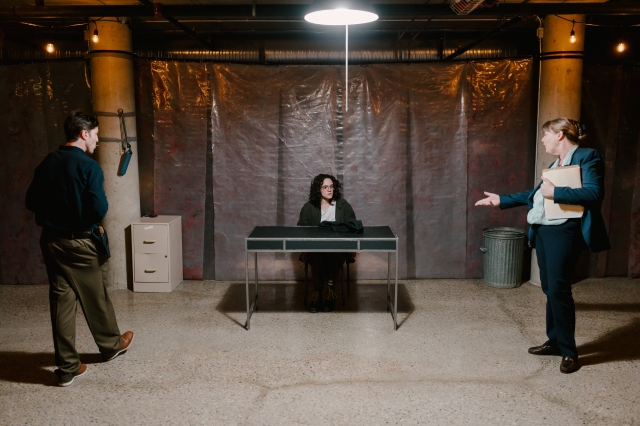
Brandon McPherson, Dayna Lea Hoffmann, Ruth Alexander in The Pillowman, Theatre Yes. Photo by Mat Simpson
By Liz Nicholls, 12thnight.ca
There’s a hooded figure, head bowed, waiting for us in a grim basement downtown. It’s a mysterious place we’ve never been before, and, ominously, it’s lined with plastic. Uh-oh.
With Martin McDonagh’s 2003 The Pillowman, Theatre Yes and director Max Rubin step up to a dark comedy with its own queasy brilliance. It’s a cunning set of interlocking stories — a veritable extravaganza of storytelling — each of them spring-loaded with horror, and with questions that seem to have answers. And then don’t.
To help support 12thnight.ca YEG theatre coverage, click here.
We are in an interrogation chamber in a totalitarian state (a completely convincing design by Heather Cornick). The prisoner, a writer (Dayna Lea Hoffmann), and her brain-damaged brother Michal (Kaden Forsberg) have been thrown in prison for reasons that elude her. True, you don’t really need a reason to get arrested in a police state; just ask Kafka. But there’s this: In the town, the horrifying child murders in Katurian’s (mostly unpublished) fables have been duplicated in real life. And a pair of menacing, and very funny, cops — the ‘good cop-bad cop’ team of Tupolski (Ruth Alexander) and Ariel (Brandon Mcpherson) — are toying with her before the inevitable execution. She can hear the sounds of her bro being tortured in the next room (hair-raising sound effects by Erik Richards).

Brandon Mcpherson, Dayna Lea Hoffmann, Ruth Alexander in The Pillowman, Theatre Yes. Photo by Mat Simpson
“I’m not trying to say anything!” Katurian argues on behalf of her gruesome stories, with their complement of severed toes, swallowed razor blades, premature burial. They’re not some how-to guide to murder. “Are you saying I shouldn’t write stories with child killings because in the real world there are child killings?”
“I don’t have themes,” Katurian adds. “Some poor little kid gets fucked up…. That’s your theme,” declares the jovial Tupolski, played with a hilarious and unsettling combination of good humour and hidden razor blades (so to speak) of exasperation by Alexander. Tupolski is constantly tussling with the more ferocious, cold-eyed Ariel, who’s itching to dispense with the prelims, and get to the torture. He’s played to a fine point of tension and danger by McPherson. Think of them as a vaudevillian pair, if you’re tuned to the key of dark.
And in the storytelling puzzle that is The Pillowman it turns out that the back stories of the two cops are germane, too. The literary ambitions of Tupolski are of maximum hilarity, masterfully delivered by Alexander.
Hoffmann, one of our most watchable young actors, is terrifically unsettling as Katurian. She argues, with some heat, for the vital importance of the imagination and storytelling, in life and in art. She’s willing to make any sort of deal, when the ultimate fate of her oeuvre comes up, a certain kind of literary fanaticism. The priority she places on her literary legacy, over everything including life, goes beyond mere dedication to craft, although the interrogation does make time for some judicious literary assessment. In this layered performance Hoffmann’s reassuring tone as a storyteller is both comical and sort of appalling. And as the child-like brother whose attention is constantly diverted, and whose great fear is boredom, Forsberg is touchingly wide-eyed and frightening in equal measure.

Dayna Lea Hoffmann in The Pillowman, Theatre Yes. Photo by Mat Simpson
The plethora of grisly stories within the story, which get told, or re-told with crucial amendments, in some cases acted out in puppetry form, resist moralizing, to say the least. The title fable, which involves a soft, caring, and comforting childhood companion who counsels children towards suicide, so they can avoid the pain and suffering of the real world, is a leading example. There’s even a Shakespeare story that will make you laugh (OK, smile). The endings of these bedtime stories for insomniacs always have a malign screwball logic of their own, as you might expect if you’ve seen other McDonaghs (think of the fingers in The Banishees of Inisherin; no, try not to). Connoisseurs of being offended in the theatre will find a lot to work with here.
Have the last couple of decades diminished the shock value of McDonagh’s dark and disturbingly playful comedy? There’s a question to consider. And I’d have to say, as an audience member, it’s still a provocation in our moment, especially in the drift toward cultural fascism. The questions that get gleefully tossed up by The Pillowman continue to land just out of reach; it seems deliberately calculated to be a test case for all of them. Are artists responsible for the effect their work might possibly have on every possible audience? Are audiences not to be trusted to think what they think? Is prescriptive art a cop-out, or a bore, or an intrusion? Are true artists created by their own suffering?
You think you know what you know, especially about happy endings. And then you leave wondering.
REVIEW
The Pillowman
Theatre: Theatre Yes
Written by: Martin McDonagh
Directed by: Max Rubin
Starring: Dayna Lea Hoffmann, Ruth Alexander, Brandon Mcpherson, Kaden Forsberg
Where: Pendennis Building, 9660 Jasper Ave.
Running: April 11 to 21
Tickets: theatreyes.com
